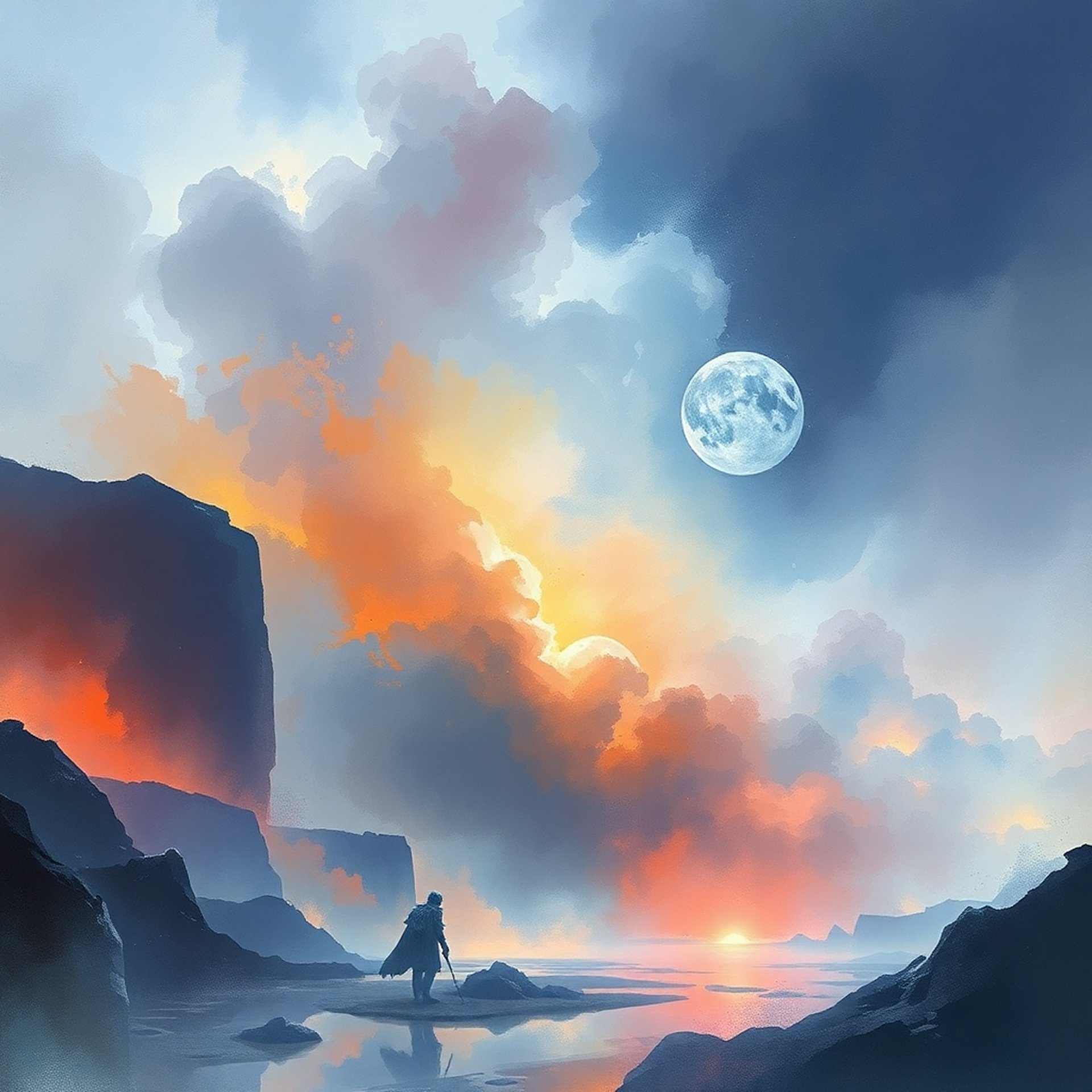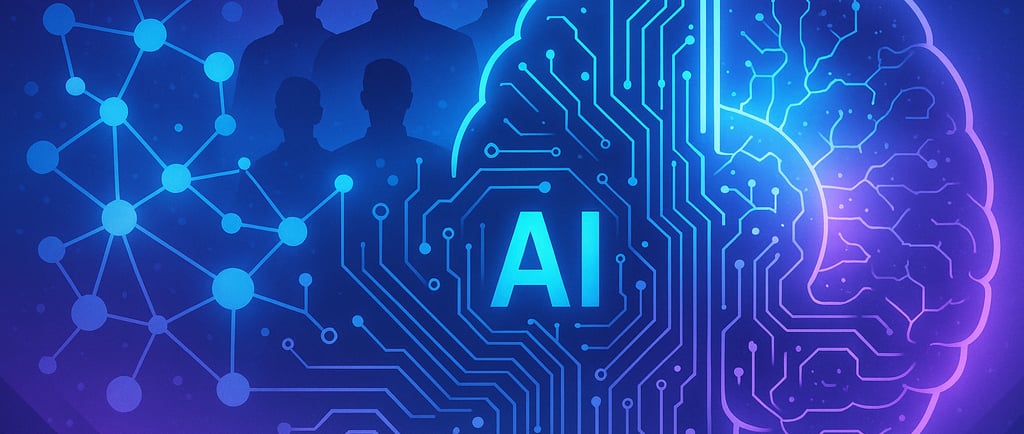
AI and the Future
Who's Leading the Way?
Shane Brown
8/6/20256 min read


AI and the Future: Who's Leading the Way?
Artificial Intelligence represents one of humanity's boldest dreams, creating machines that can think, learn, and reason like us. From mathematical theories to today's revolutionary breakthroughs, AI's journey is packed with visionary pioneers and game changing moments that are reshaping our world. This is the story of how we got here, where we're going, and the remarkable people leading us into the future.
The Founding Fathers: Where It All Began
Alan Turing: The Original AI Visionary
Alan Turing laid the groundwork for everything we know about computers and AI today. This British mathematician wasn't just cracking codes during World War II, he was imagining a future where machines could think.
In 1947, Turing gave what was likely the first public lecture on computer intelligence. "What we want is a machine that can learn from experience," he told a London audience, "and the possibility of letting the machine alter its own instructions provides the mechanism for this."
His most famous contribution? The Turing Test from 1950, a deceptively simple question: if a machine can convince a human it's human through conversation, can we call it intelligent? This test still challenges AI researchers today.
John McCarthy: The Man Who Named AI
John McCarthy didn't just give artificial intelligence its name, he shaped its early direction. In 1955, this young Dartmouth researcher proposed something unprecedented: a summer workshop dedicated to studying "artificial intelligence." It was the first time anyone used that term.
McCarthy also created LISP, the programming language that powered AI research for decades. His vision was remarkably ahead of its time in 1960, he predicted computation would someday be organized as a "public utility," essentially describing cloud computing 50 years early.
The 1956 Dartmouth Conference he organized officially launched AI as a scientific field, bringing together the brightest minds who would shape decades of research.
The Deep Learning Revolution: The Godfathers of AI
Three researchers earned the title "Godfathers of AI" for revolutionizing how machines learn: Geoffrey Hinton, Yann LeCun, and Yoshua Bengio.
Geoffrey Hinton, known as "the Godfather of AI," spent 50 years developing neural networks, computer systems that mimic how our brains process information. In 2012, working with students at the University of Toronto, Hinton created AlexNet, a neural network that could recognize images with unprecedented accuracy. This breakthrough launched the modern AI revolution.
What's fascinating is Hinton's recent transformation from AI pioneer to cautionary voice. In 2023, he left Google to speak freely about AI's risks, saying he regrets parts of his life's work. "Look at how it was five years ago and how it is now," he warned. "Take the difference and propagate it forwards. That's scary."
Yann LeCun revolutionized computer vision with Convolutional Neural Networks. Working at AT&T Bell Labs in the 1980s, LeCun developed systems that could read handwritten digits, technology that processed millions of bank checks daily. Today, as Meta's Chief AI Scientist, he continues pushing the boundaries of machine vision.
Yoshua Bengio focused on the theoretical foundations of machine learning. Growing up inspired by science fiction, Bengio's work on neural networks laid crucial groundwork for today's language models and AI assistants. Like Hinton, he's become a voice of caution, working to ensure AI development benefits humanity.
Modern Visionaries: Leading Today's AI Revolution
Sam Altman: From Dropout to AI Revolutionary
Sam Altman's journey from Stanford dropout to OpenAI CEO reads like a tech legend. After founding a mobile app company and spending nearly a decade at Y Combinator, Altman's defining moment came in 2015 when he met Elon Musk.
Both were concerned about artificial general intelligence falling into the wrong hands. Their solution? Create OpenAI, dedicated to ensuring AGI benefits all humanity.
The path hasn't been smooth. In November 2023, OpenAI's board dramatically fired Altman, only to reinstate him five days later after massive employee and investor pressure. This episode highlighted ongoing tensions between AI safety and commercial interests.
Altman's vision is ambitious: he believes OpenAI "knows how to build AGI" and predicts "fully autonomous agents that are better than humans at everything by the end of 2027 or so."
Demis Hassabis: The Gaming Genius Who Solved Life's Code
Demis Hassabis brings a unique background to AI, he's a former chess prodigy, video game designer, and neuroscientist all in one. At 17, he coded the bestselling game Theme Park, using profits to fund his Cambridge education.
After a decade in gaming, Hassabis earned a PhD in neuroscience, then co founded DeepMind in 2010 with a mission to "solve intelligence and then use intelligence to solve everything else."
DeepMind's breakthrough came with AlphaGo, the first AI to beat a world champion Go player. But Hassabis's greatest achievement may be AlphaFold, which solved the "protein folding problem" predicting how proteins fold into 3D shapes. This breakthrough is revolutionizing drug discovery and our understanding of life itself.
"I want to understand how the universe works," Hassabis explains. For him, AI isn't just about smarter machines, it's about unlocking existence's deepest mysteries.
Where We're Heading: The AGI Race
The timeline for artificial general intelligence, AI that matches human intelligence across all domains, is shrinking fast. Early predictions placed AGI decades away, but current surveys suggest 2027-2040.
Industry leaders are even more optimistic:
Sam Altman believes OpenAI knows how to build AGI
Dario Amodei of Anthropic predicts AGI by 2027
Demis Hassabis gives it 5-10 years
Some forecasters suggest 2026
What's remarkable is how these predictions have accelerated. Just five years ago, most experts thought AGI was 50+ years away. ChatGPT and similar breakthroughs have dramatically shortened timelines.
AI's Transformation of Everything
By 2030, AI will be everywhere but invisible. It'll quietly manage power grids, personalize education, diagnose diseases before symptoms appear, and guide legal decisions. The technology will be so integrated into daily life that most people won't notice it.
Healthcare Revolution:
Precision medicine tailored to individual DNA and lifestyle
Earlier disease detection and prevention
Drug discovery accelerated from decades to years
Workplace Transformation:
Goldman Sachs predicts AI could affect 300 million jobs globally
New roles will emerge as AI becomes a collaborative partner
Skills in creativity, emotional intelligence, and ethics become increasingly valuable
Real Stories of AI Career Transformation
From HR to AI Engineer
Consider a psychology graduate who started in HR, watching colleagues analyze data by printing spreadsheets and reading them with rulers. Frustrated by the disconnect between workplace reality and digital potential, she made a bold decision to transition into AI engineering through Singapore's AI Apprenticeship Programme.
"I feared the day where I would accept the status quo and live as a mindless office drone," she reflected. Her journey from human resources to artificial intelligence shows career transformation is possible with determination and the right opportunities.
Solo Entrepreneurs Using AI as Co-Founders
The AI revolution is democratizing entrepreneurship. In 2024, 36% of startup founders went solo, double the 2017 figure, largely because AI can replace entire workflows. Modern entrepreneurs use AI for coding, customer support, marketing, and design, making it possible for individuals to build globally competitive businesses.
This trend particularly empowers underrepresented founders who face traditional funding barriers. AI tools allow rapid prototyping, idea validation, and low cost scaling.
Your Role in AI's Future
The AI revolution isn't just about technology, it's about people. Every breakthrough came from individuals who dared to imagine differently.
Whether you're a student, professional considering change, or entrepreneur with a bold idea, the AI revolution offers unprecedented opportunities:
For Students:
61% of college students say AI has significantly influenced their career plans
Skills in AI, machine learning, and data analysis are increasingly in demand
Develop both technical skills and uniquely human capabilities like creativity and ethical reasoning
For Career Changers:
AI tools make upskilling and transitioning into tech easier than ever
Focus on collaborating with AI rather than competing against it
Consider how AI can enhance your existing expertise
For Entrepreneurs:
AI democratizes innovation, enabling powerful solutions with small teams
The challenge isn't technology access, it's finding meaningful problems to solve
Consider how AI can address underserved markets and create inclusive solutions
Writing the Next Chapter
We're at an extraordinary moment in history. The dreams of Turing, McCarthy, and other AI pioneers are becoming reality faster than anyone imagined. The next decade will likely bring artificial general intelligence, revolutionize how we work and live, and potentially unlock solutions to humanity's greatest challenges.
But this future isn't predetermined. It'll be shaped by the choices we make, values we embed in systems, and people we empower to lead. The story of AI is ultimately about human ambition, creativity, and our drive to push beyond what seems possible.
Every breakthrough in AI came from someone willing to take risks, learn continuously, and believe in a better future. Whether you join an established tech company, start your own AI venture, or apply AI to solve problems in your field, you can help write the next chapter.
The future of AI isn't just about who's leading today, it's about who will step up to lead tomorrow. That person could be you.
The AI revolution is here, and it's looking for leaders who can navigate both its incredible promise and profound challenges. Are you ready to be inspired and to inspire others as we build the future together?
